From Beijing to Tlatelolco: the 16th Regional Conference on Women and actions to address child marriage and early and forced unions
From 11 to 15 August, Mexico City hosted the 16th Regional Conference on Women (2025). Girls Not Brides’ membership in Latin America and the Caribbean, together with the regional secretariat, came together to highlight child, early and forced marriage and unions as one of the main barriers to gender equality and the full exercise of the rights of girls and adolescents within care societies.
Thirty years on from the Beijing Platform for Action and fifty years since the First World Conference on Women
The LAC region has been the stage for historic transformations in the struggle for the rights of women and girls, but also reveals persistent challenges in contexts of shrinking civic space. In the days leading up to the Conference, the Inter-American Court of Human Rights recognised the right to care as an autonomous human right (to receive care, to provide care under dignified conditions, and to self-care): a milestone that reinforces the centrality of care in the regional feminist agenda and the new wave of activism by girls, adolescents and young people, who are claiming their place as protagonists in shaping the public policies of today and tomorrow.
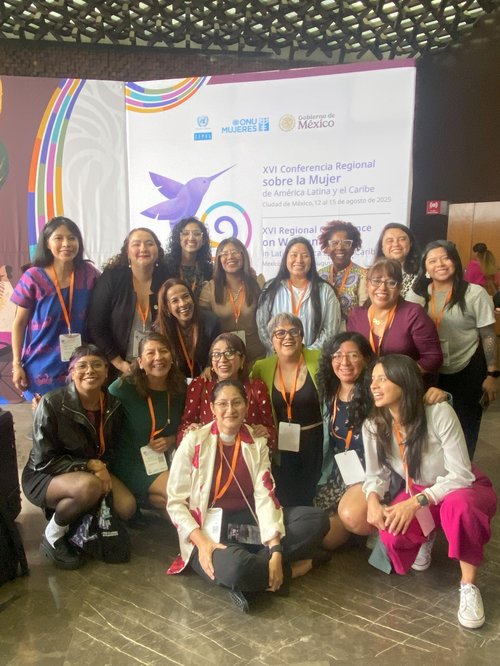
In the same way, the Tlatelolco Commitment adopted by States included a call to UNICEF, UNFPA and UN Women, in coordination with ECLAC, to strengthen knowledge, capacities and monitoring mechanisms for national actions to prevent adolescent pregnancy and to end harmful practices such as child marriage and early unions. This represents a significant step forward in positioning child, early and forced marriage and unions on the public agenda; the challenge now is to translate it into concrete and sustainable national public policies.
Feminist Forum 2025: regional articulation
As part of the regional network, Girls Not Brides played an active role in organising the 2025 Feminist Forum (within the communications and methodology commissions, as well as the steering group in Mexico) and contributed resources to make it possible. This participation helped to strengthen the flow of information and to ensure the active presence of the regional membership in the forum, guaranteeing that perspectives on child, early and forced marriage and unions were represented in civil society discussions.
The forum provided a critical framework for reflecting on the progress since Beijing and opened debates on futurisms and care, under the guiding question: What kind of world do we want to build? It brought together activists, academics, women leaders and young people from across the region, ensuring diverse and intergenerational representation.
The Feminist Forum declaration can be found here.
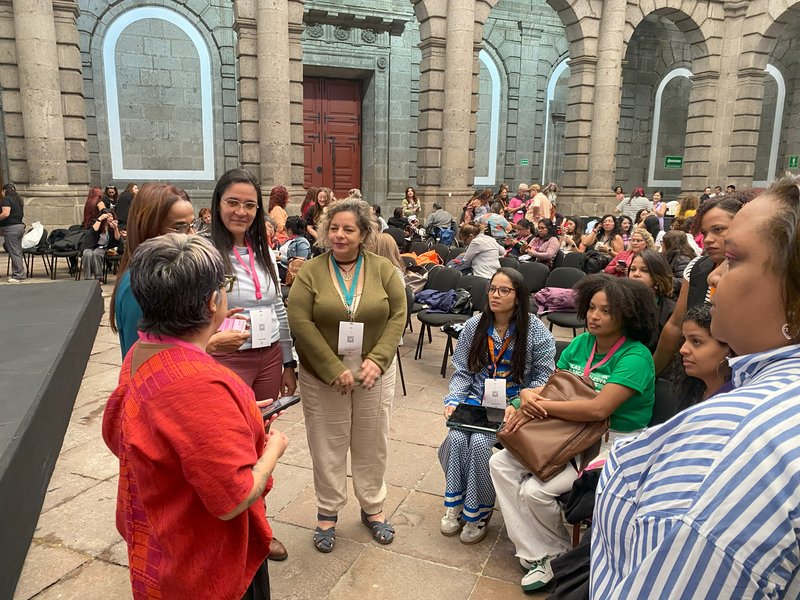
Parallel Event: Voices Driving Change: Strategies to Address Child, Early and Forced Marriage and Unions in Latin America and the Caribbean
At this event, co-organised with Aliadas, young activists, legislators and representatives of international organisations came together to reflect on the challenges and strategies for tackling child, early and forced marriage and unions in the region. Young and feminist voices set the tone of the conversation, bringing local experiences, lessons learned and innovative proposals to the forefront.
From Jovenas Latidas, Danha Alvarado highlighted the impact of care roles imposed on girls and adolescents. She also stressed the urgency of creating space for girls and adolescents to be heard and made visible:
“On a bridge, a girl in marriage or an early union, or facing adolescent pregnancy, is the last to cross that bridge. We cannot take a step forward unless it is recognised that girls and adolescents must be cared for, not be the carers.”
Legislators and high-level representatives from Bolivia, Brazil and CEDAW also took part, as did Jennifer Pedraza, Member of the Colombian House of Representatives, who shared how, after eight attempts, Law 2447 “Niñas No Esposas” was finally approved, removing child marriage from the Civil Code:
“We decided not to approach child marriage from a punitive perspective. In other countries this approach had made girls and adolescents feel persecuted, closing off their access to the State and to health services. Our aim is to accompany them, not punish them.”
Pedraza also explained a mechanism of patrimonial sanction for adults who contract unions with minors, in order to protect the property rights of adolescents and dissuade those who engage in this practice.
Danha Alvarado
Jennifer Pedraza
ALIADAS
Participatory Session: Options, not Sanctions: Redefining Responses with Non-Punitive Approaches to Child, Early and Forced Marriage and Unions
As part of the Conference, a participatory session entitled “Redefining Responses with Non-Punitive Approaches to Promote the Autonomy of Children and Adolescents” was held, co-organised with nine Girls Not Brides member organisations in Mexico, with the aim of highlighting child, early and forced marriage and unions as a priority issue in the region and proposing comprehensive alternatives from a non-punitive perspective.
During the session, the theoretical and practical tool “Options, not Sanctions” was presented, bringing together lessons learned and strategies to address, prevent, repair and transform the contexts that condition or encourage child marriage and early unions.
“Instead of punishing or resorting to the excessive use of criminal law, what is being proposed is to address, prevent, repair and transform.” — Yuli Pliego, Consultant and author of the tool.
Colombian congresswoman Jennifer Pedraza shared the legislative experience behind the Niñas No Esposas Law, stressing the importance of articulation between civil society organisations and legislators:
“The best way to talk about this issue is as a cultural struggle, and the fact that it is not punitive does not mean that it is easier — quite the opposite, because it requires questioning what is most normalised in our society.”
Guillermina Juárez, from Mano Vuelta, shared some of the actions her organisation carries out at the community level to address child marriage and early unions. The session also included contributions from the Hidalgo Women’s Institute, the Office for the Protection of Girls, Boys and Adolescents of the Family of the State of Hidalgo, Congresswoman Patricia Mercado, the Congress of Colombia, UNFPA Mexico, and Anahí Sarmiento, Secretary for Women of Oaxaca.
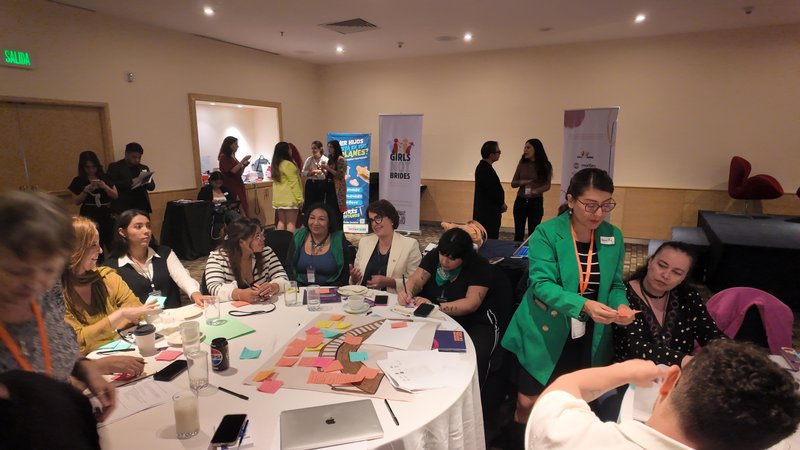
The second part of the session was structured around three working groups that brought together civil society organisations from across the region, public officials from Mexico and Colombia, and international organisations. They reflected on the roles of each actor — from community to government and legislature — and identified immediate actions to move forward from an integral perspective.
Among the proposals, the need for a broad alliance between governments, journalists and civil society stood out, one that would be “powerful, visible and allow for the construction of indicators from the community level up to the federal level”, as noted by Gloria Contreras of MEXFAM.
The exercise made it possible to outline potential joint pathways, building on what already exists, identifying gaps and adding what each actor can contribute. As Karime Rocha, from Balance, summarised:
“Here we are representing many kinds of knowledge and experiences, from civil society but also from the public sector. So we are not only talking about methodology, but also about the actions we can strengthen as civil society and as society as a whole.”
This space did not close the conversation; rather, it opened the way towards a clearer route for Mexico and the region, bringing together collective experiences and learning.
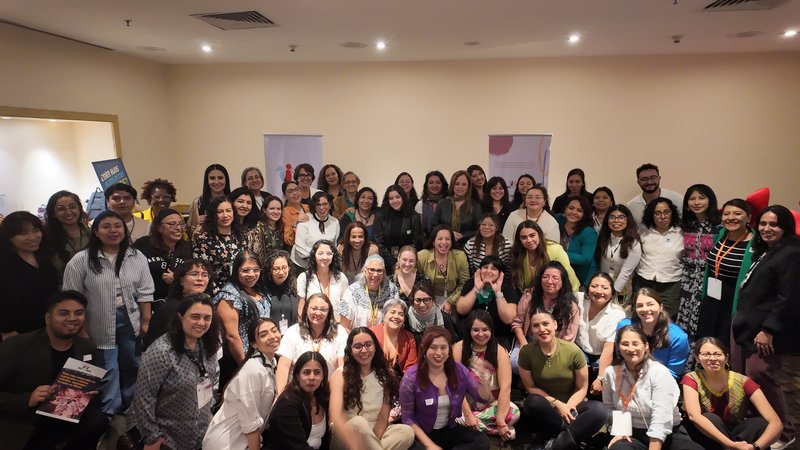
Art and a Collective Promise: A Future of One’s Own
Among the participatory spaces of the Regional Conference on Women, the immersive sound installation Un Futuro Propio was presented at the Museo de la Ciudad de México with the support of the Secretariat of Culture and created by Estudio Plumbago together with Girls Not Brides.
The experience invites visitors to walk among voices whispering promises: girls and adolescents from Latin America and the Caribbean who, in letters to their “future selves”, promise not to hide again, to grow without asking permission, not to be invisible, to claim the right not to disappear. In every poem beats an intimate and collective commitment: a chest full of flowers that do not wither, a tree breaking through until it tears down walls and reaches the light.
More than an artistic work, Un Futuro Propio is an act of memory and political imagination. Each visitor becomes a witness to these promises and, at the same time, part of them. The installation does not only show what girls and adolescents dream of, it also invites those who walk through it to make a commitment of their own: to recognise their voices, to uphold their rights and to accompany the building of a future free from child, early and forced marriage and unions.
The exhibition, part of the global campaign #DearFutureMe / #QueridaYoDelFuturo, remains open to the public at the Museo de la Ciudad de México until further notice.
Girls Not Brides thanks the organisations that laid the foundations of this campaign by collecting these voices: Girls First Fund, Plan International in Latin America and the Caribbean, MAIA in Guatemala, Movimiento por Ser Niña in Ecuador, and the Secretaría de la Mujer for ensuring that this artistic experience formed part of the activities of the 16th Regional Conference on Women.
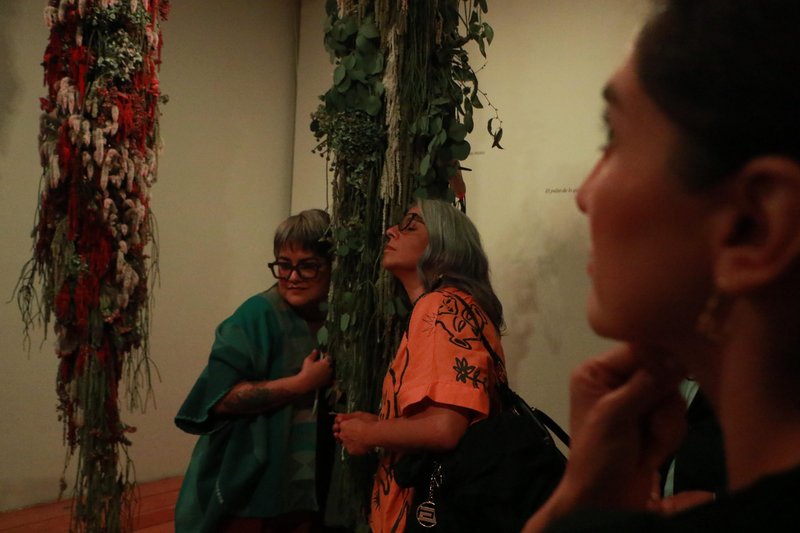
From commitments to policies
The political recognition achieved at the Conference —including the paragraph in the Tlatelolco Commitment on adolescent pregnancy and child, early and forced marriage and unions— is a key step in keeping the issue on the public agenda. The next challenge is for governments, with the support of civil society and the feminist movement, to operationalise this recognition through budgets, inter-institutional coordination, effective participation of girls and young people, and non-punitive approaches that address structural causes.
Girls Not Brides LAC membership will continue to strengthen capacities, open spaces for advocacy and amplify voices so that no life project is conditioned by child marriage or early and forced unions. The goal remains the same: effective and sustainable public policies that guarantee autonomy, rights and futures full of possibilities.
In the time it has taken to read this article 93 girls under the age of 18 have been married
Each year, 12 million girls are married before the age of 18
That is 23 girls every minute
Nearly 1 every 2 seconds